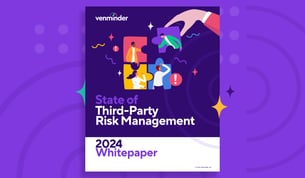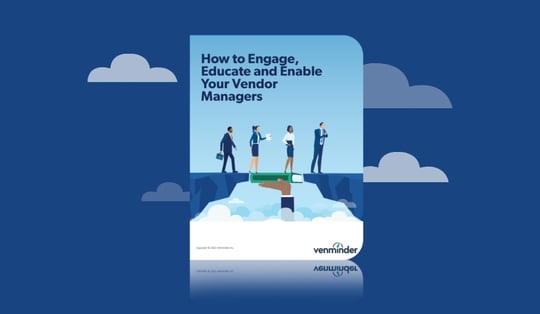Educating vendor managers about vendor risk management can be challenging if you don't know where to start. You’re probably quite familiar with your vendor risk management processes and program, and you know why you do things in a particular way.
Unfortunately, this isn't always easy to communicate to vendor managers, who often have other priorities and goals besides managing vendor risk. You will be able to better educate vendor managers if you know how to address some of the following questions.
5 Questions to Ask When Educating Vendor Managers
Vendor managers are typically knowledgeable about a vendor's products or services, but must also be educated about their role in vendor risk management. Because vendor managers work with your vendors regularly, they’ll often be the first to discover any issues that must be addressed.
Consider the following questions as you prepare to educate your vendor managers:
- Why do they need to be educated? Identify some of the key reasons vendor risk management is critical for your organization's and customers' welfare. When vendor managers understand the purpose behind their vendor risk management duties, they'll be more likely to be engaged and compliant.
- What tools can we use to educate? Thanks to an abundance of free resources online, you can educate your vendor managers, even if your budget is limited or non-existent. A self-service training platform can be an excellent option for organizations with a budget but not enough personnel.
- How can we repeat this education? Education and training should be designed in a repeatable, reproducible manner, making it easy to train new vendor managers when they join your organization. Maintaining consistency with your education will help you ensure that all vendor managers are aligned with your goals.
- Should we outsource this education? Outsourcing your vendor risk management education might be a good option if you lack enough time and resources to do the job effectively. Many vendor risk management modules or software platforms offer corresponding training and education, which can be a valuable investment.
- How can we verify that the education is successful? It’s essential to verify that the vendor managers have understood and can apply the training they’ve received before allowing them to handle the necessary tasks. Checking their knowledge through a quiz or case study can help identify any gaps that need clarification.
3 Best Practices to Educate Vendor Managers Successfully
It takes skill and effort to educate vendor managers about vendor risk management. Although there may be some challenges along the way, these best practices should help make the process easier:
- Keep it simple – Vendor risk management training must be simple yet comprehensive so everyone can understand it, regardless of their background or previous experience.
- Ensure it’s timely – Ideally, vendor managers should be educated and trained within 30 days of joining your organization or acquiring a vendor relationship for the first time.
- Communicate often – Keep the lines of communication open with your vendor managers and encourage them to provide regular feedback on your vendor risk management training processes. Ask for feedback about what is working and what needs to be improved.
When you consider the right factors, identify available resources, and apply best practices, you can develop solid education and training for your vendor managers. But it's essential to realize that developing and improving education and training is a continuous process. Just like vendor risks change over time, so should your vendor risk management education. Don't forget to update your vendor risk management training and processes as your organization's vendor risks and relationships evolve.

















